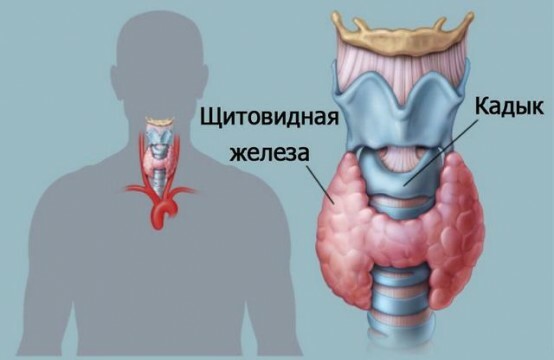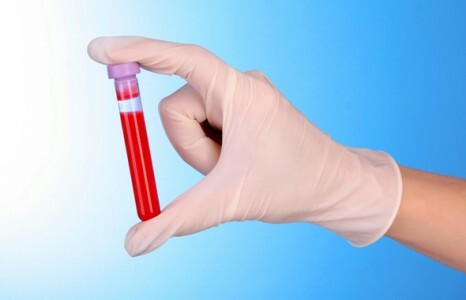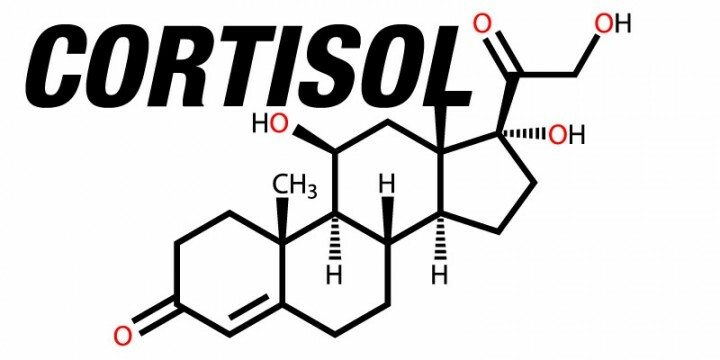Thyroid gland diseases began to occur more often in recent years, noticeably "younger", and cases of hereditary ailments associated with changes in the thyroid gland have already ceased to be a rarity. For the most part, this is due to the dysfunctional eco-environment, the consequences of industrialization and the modern pace of life.
An important role is played by eating foods with insufficient iodine and drinking water containing chlorine and fluorine. Human intelligence is directly dependent on the iodine content in the body. According to WHO, iodine deficiency caused more than 45 million people with mental retardation.
Thyroid gland and its role in the body

The thyroid gland is one of the eight endocrine glands located near the trachea, between the Adam's apple and the clavicle, and has the shape of a "butterfly".The thyroid gland produces iodine-containing hormones and calcitonin, and is also a kind of keeper of iodine.
Calcitonin is a hormone that promotes the incorporation of calcium into bone tissue, helps the reproduction, activity of young bone-forming cells - osteoblasts.
Hormones that contain the body's iodine are called tyronines. Subdivided by the number of iodine molecules:
- triiodothyronine or abbreviated T3;
- tetraiodothyronine - T4.
These hormones are indispensable participants in the metabolism of our body. Hormones differ not only in the number of iodine units. So T4 - is in the body in a larger amount, and T3 - in a smaller, but T3 is more active, but both are serving, responsible for self-regulation of the body, the rate of metabolism.
With a lowered content of the hormone T4( hypothyroidism), the body quickly grows old, the metabolism slows down, with increased -( hyperthyroidism), the rate of metabolism increases, as a result - rapid wear of organs. Both are good for health.
The thyroid-stimulating hormone produced by the pituitary gland, TTG, affects the work of the thyroid gland, its production of T3 and T4, regulation of its secretory activity.
Who is at risk? First of all, these are women and children. The thyroid gland requires special attention during pregnancy, lactation and menopause. Persons predisposed to thyroid diseases living or staying for some time in places with severely disturbed ecological balance, or in areas where the radioactive background is elevated. In the Russian Federation, iodine deficiency has not been observed in most regions, but in 30 regions is deficient in iodine .What administrative-territorial units concern them, it is necessary and important to know their residents.
This is the Republic of Komi, Sakha, Tyva, Karelia. Iodine deficiency is observed in Kabardino-Balkaria, North Ossetia, Kalmykia, Udmurtia, Khanty-Mansiysk Okrug, Moscow and the Moscow Region, St. Petersburg and the Leningrad Region, Krasnoyarsk, practically throughout the Central Federal District, as well as the Tyumen, Sakhalin and Novosibirsk Regions.
In these regions it is recommended to eat iodized salt.
Symptoms that determine thyroid dysfunction

Your body needs to be able to listen and hear. When there are failures in his work, he signals it. If you do not pay attention to the "bells" of the body about the deterioration of health, treat negligently, then the risk of earning a serious disease increases at times. Not always the body can cope on its own, often it needs help from the outside.
First signs to look out for:
- a sharp decrease or increase in weight, with normal diet and diet, a normal appetite;
- feeling of constant fatigue, lethargy, nervousness, groundless irritability, insomnia, memory impairment, attention;
- enlargement of the thyroid( appearance of goiter);
- heart rhythm disturbance;
- swelling of the legs, face, neck;
- pain or discomfort when swallowing, the appearance of hoarseness;
- violation of thermoregulation. Hypothyroidism gives chills, while hyperthyroidism - fever, sweating ;
- disorders of the menstrual cycle, infertility in women, decreased libido in men;
- dryness of skin, hair loss and fragility, brittle nails.
Self-diagnosis
- To check it is necessary to stand in front of the mirror, carefully examine if there is a swelling in the neck between the Adam's apple and collarbone.
- Near the mirror, drink a little water, slightly tilting the head back - if swallowed, it should be good to see an Adam's apple, a neck without swelling, transverse folds. For greater reliability, this check is carried out several times;
- On the heel of the foot and neck, apply iodine mesh. The gland functions normally if the net on the neck disappears almost completely after one hour, and on the heel after seven to eight.
At the slightest deviation from the norm, it is necessary to consult a doctor who, if necessary, will write a direction for blood tests for the hormones TTG, T3, T4 and the direction to the endocrinologist.
What diagnostic methods are used:
- general, biochemical, if necessary, other specific blood tests( content of proteins, lipids, etc.);
- blood test for the content of TSH, T3( free) and T4( free);
- analysis for antibodies to thyreperoxidase - AT to TPO;
- ultrasound;
- study on the uptake of radioactive iodine;
- scintigraphy;
- tomography;
- thermography;
- biopsy.
For a more accurate diagnosis, before visiting an endocrinologist, remember as many of the symptoms as you are concerned, which have recently suffered illnesses, even events that could cause you great excitement, stress. To forget nothing and not to mix up, it is desirable to write down the data.
Recommendations for preparing for the analysis of T3, T4, TTG and other hormones

- for 1-2 days before taking the test, you should exclude sharp, fatty foods;
- will try to refrain from smoking at least one day before taking the test;
- to avoid physical activity, going to the sauna, sauna for three days before taking the test;
- in case of taking hormonal, other medications, the course is interrupted two weeks before the analysis of on the recommendation of a doctor! ;
- a day before you pass the analysis to stop taking vitamins, dietary supplements;
- you can drink plain, non-mineral water, without gases, not chlorinated and not fluorinated;
- a week before taking the analysis to exclude the use of drugs with iodine content;
- is important and your state of mind, a few days before you need to take the analysis, try not to be nervous, not to be irritated - it can also affect the results;
- in the evening before you give the test try to refrain from food at all, ideally to refuse to eat for 12 to 24 hours;
- in case you underwent X-ray diagnostics, ultrasound, tomography, scanning, 3-5 days before you take the test, be sure to consult a doctor;
- for 3 days before the analysis completely abandon alcohol;
- analysis on TTG, T3, T4 can a woman can take any day of the menstrual cycle;
- blood must be taken before 10 am, on an empty stomach;
- for analysis on T3, T4, TTG and other hormones blood is taken from the vein.
Norms of T3, T4, TTG, AT to TPO of thyroid gland
- T4 free is responsible for the exchange of proteins. Indications in the norm fluctuate from 10.0 to 25.0 pmoles / l .T4 total - from 52 to 155 nmol / l .With increased indices, metabolism is accelerated, oxygen uptake is activated, it is characteristic of hypothyroidism, toxic goiter, etc., lowered indices indicate a trauma to the pituitary gland;
- T3 free is responsible for the activation of metabolic processes of tissues and the absorption of oxygen by the tissues of the body. Indications T3 free in norm varies from 4,0 to 8,6 pmoles / l .T3 total - from 1,02 to 3,0 nmol / l .Abnormalities indicate dysfunction of the gland;
- TTG is produced by the pituitary gland and is necessary for the development of free T3, T4 and internal regulation of the processes in the thyroid gland. The parameters are normally in the range from 0.3 to 4.0 μIU / mL , in pregnancy - 0.2-3.5 μIU / mL .Elevated levels of TSH indicate adrenal dysfunction, hyperthyroidism, mental disorders;
- AT to TPO up to 30 IU / mL high rates may indicate an autoimmune disease, such a disease is also called Hashimoto's thyroiditis, or indicate the presence of oncology.
Any person, regardless of gender and state of health, at the age of more than 40 years must necessarily every two years undergo an endocrinologist's check and pass a blood test for hormones, until this age is enough once in five years.
According to WHO, among endocrine diseases, the first place in the distribution belongs to diabetes mellitus, the second thyroid disease. Take care of yourself and be well!
Similar records





